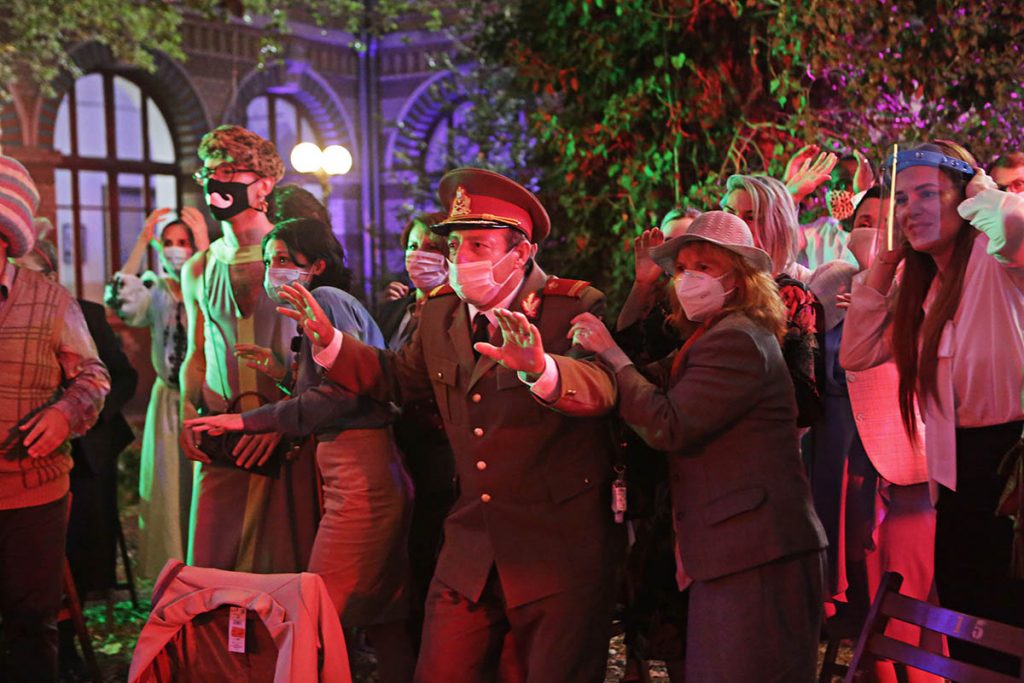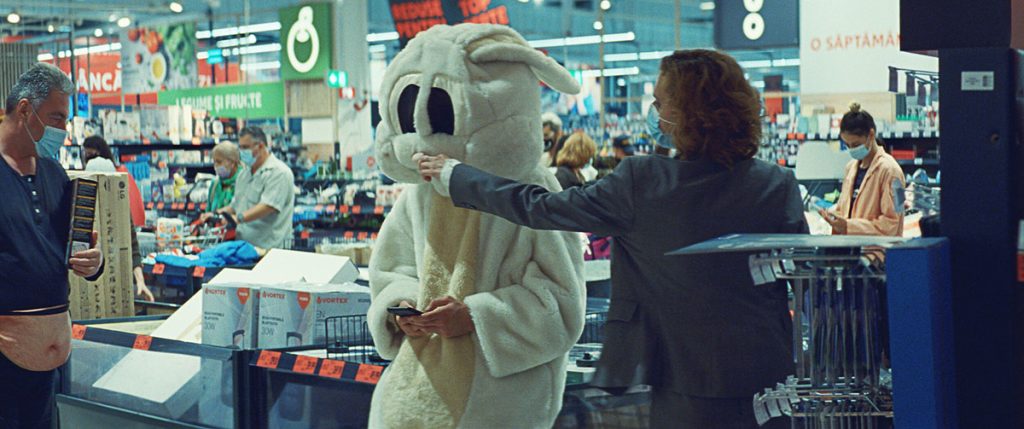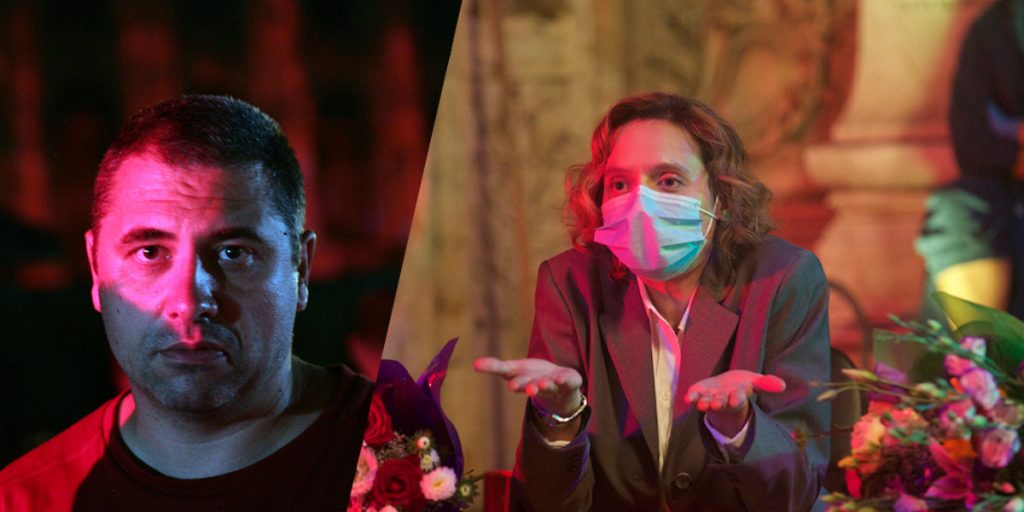Before its screening at the London Film Festival, we interviewed director Radu Jude about his Golden Bear-winning Bad Luck Banging or Loony Porn.
Bad Luck Banging or Loony Porn comes from the bright, brave mind of Radu Jude. It is a drama comedy and is a savage indictment of Romanian society, tackling topics of sexism, racism, conspiracy theories and more, whilst also making striking commentaries on history and our place in it.
The film, which won the Golden Bear at Berlin Film Festival, is split into three distinct but equally effective parts. The first and third follow Emi (Katia Pascariu of Beyond the Hills), a teacher at a prestigious school in Bucharest, and the ensuing scandal which erupts after a sex tape between herself and her husband circulates widely on the internet. Bad Luck Banging follows Emi in her normal, everyday routines in the first part, before concluding with a surreal, uncomfortable, courtroom-style scene, as she is effectively put on trial by the schoolchildren’s elite, powerful parents. Nestled in the middle is a wonderful collection of montages, some as short as a couple of seconds long, others playing for a few minutes, but all of them are relevant, fierce and memorable.
Jude’s impressively complex screenplay and fresh direction ensure the film bolts along at an incredible pace and, combined with some memorable acting, will make audiences laugh, turn away in shock and cover their faces in embarrassment for humanity (maybe all at the same time).
Just before Bad Luck Banging played at London Film Festival, we sat down with Jude to discuss the themes, plot points, Romanian cinema and more, giving us an insight into one of the most singular and challenging directors working today.
Society: Radu Jude on keeping things relevant
Thanks for speaking to us today, Radu, we loved the film! A lot of the issues and themes in Bad Luck Banging are very relevant to today’s society. When did the idea for the film first form your mind?
Radu Jude: There were a lot of stages to it. Cases like this [the sex tape] were brought to the tabloid press in quite cheap ways. I was shocked, not by the news itself, but by the comments, which were extremely dirty and abusive. That stayed in my brain for a while and then, all of a sudden, I realised that so many people can become really aggressive at topics like this. I was so angry about peoples’ reactions that I wanted to make a film about it. And the concept of videos being shared widely on the internet is a new reality and problem, and is something that provokes discussion, so I thought I should explore it. If I wanted to describe a chicken, you would describe what she eats, her background, so I felt the same. I couldn’t describe the situation, in an artistic way, without connecting it to bigger things like the environment or ideologies or politics or philosophies. The film is about what is around the story rather than the story itself.
The camera often moves away from the character Emi and rests on everyday objects and buildings in the street. What were you aiming for with these shots?
RJ: If you film a bear in the woods, then you also have to try and describe its surrounding environment. I wanted to capture this environment in which Emi was walking around in. When you film something, you have to make a choice to frame something and through this, you make connections. I’m interested in montage – like Sergei Eisenstein [director] – as not only a way to create stories using juxtaposition of images but to make connections between things too. And from this, I thought, why not make a montage with the camera which follows Emi? I tried to find things that had symbolism but sometimes, there’s not always meaning there.
Sometimes it just happens.
RJ: Exactly. Here we have this Chinese robe [points to garment on wall]. This says something about our culture these days. It’s a sign. It’s interesting to look at things in this way, in a historical way. It’s history already.
That first chapter is so organic and almost like a one-take shot.
RJ: Yes, and I know the city [Bucharest], and some of those places and things have already changed since I’ve shot there. Cinema has this power to capture things and preserve an image for a long time.

Talking of history (although it’s still ongoing), how did the pandemic influence the film, in terms of the story and script?
RJ: Of course, it influenced it. Before Bad Luck Banging, I made some films that had to do with history, which I became a bit fed up with. When I decided to make this film, I wanted it to be extremely contemporary, to be like a document of our time, and that was before the pandemic! But then COVID happened and I had a lot of discussions with producers who said we should hide the pandemic or even postpone the film. But I said no! Let’s do it now! If it’s contemporary, we can express what is contemporary, and if there’s a pandemic, then so be it. But in terms of production, it changed a lot. All of the scenes inside, we moved outside. Even the last part of the film was meant to be in a classroom [in the end, it takes place outside, in a courtyard]. And with masks on the actors, it doesn’t matter if we don’t see their faces: it just becomes another anthropological thing.
The masks’ designs reflect a person’s personality in many ways too.
RJ: Yeah, exactly. I didn’t want to hide the pandemic. And the shoot was actually faster. We were so aware that if someone got sick, we would be shut down. I rushed the film as much as I could. We had a smaller crew, but the filming, which normally creates a very nice ‘society’, it wasn’t the same. We couldn’t go to a bar after shooting or even have lunch breaks together, which was a little bit sad, but it was just the conditions we had to make do with. And no-one got sick with COVID during the production.
That’s impressive, considering big productions have shut down for weeks when someone has tested positive.
RJ: And in the city, whilst we were shooting, the cases were going up and up.
The Process: Challenges in shooting Bad Luck Banging or Loony Porn
The sex scenes at the start of the film are unsimulated.
RJ: Yes, but we had a porn actor.
Was it a challenge for the actors?
RJ: For the penetration scene, we did change the actress [Katia Pascariu] to someone else. But the rest of the scenes were Katia. She is a very brave actress, doing a lot independent and political theatre.
The opening shocks the audience in quite an effective way.
RJ: Originally, the sex tape wasn’t meant to be at the start of the film, but then I thought it was like a piece of evidence. I needed the people, the spectators, to see in order to have their own judgement. It’s like in trial: you present the evidence and let people make their decision. I didn’t want to frustrate viewers by not allowing them to see it in all its entirety.
It’s a shame Ada Solomon [producer on Bad Luck Banging] couldn’t be here today. You’ve worked with her on a number of projects now. How has your working relationship developed over the past 20 years?
RJ: It’s a very professional, correct relationship. We respect each other. She never tries to impose on my creative process. If I want something in my way, we will discuss it but she won’t refuse. If she says she needs more money or can’t specifically do something for whatever reason, that’s fine too. It’s a collaboration.
It’s a film with a lot of comedy, but it also some very dark moments. What was the atmosphere like on set when dealing with heavy themes such as racism and sexism?
RJ: It wasn’t much different from other shoots. Comical moments have less to do with the situation themselves and more to do with the angle at which you look at things. Some people can find the comical side, the political side, or the psychological side. I am always amazed by people who can suddenly see something differently. Cinema can be important in this, in decolonising our views, challenging us to see something in a fresh way.

Creation: Radu Jude on breaking boundaries
Without spoiling anything, the final scene (the third ending) of this film is quite remarkable. How did you come up with such a brilliant and crazy ending?
RJ: I wanted the film to feel like a sketch. I wanted the three endings: one with an optimistic ending, another with a pessimistic ending, and the third one as an imaginary ending, like some sort of revenge. I think it appeared little by little.
Bad Luck Banging or Loony Porn is not a conventional film and breaks a lot of boundaries. Were you surprised when it won The Golden Bear at Berlin?
RJ: Absolutely! Looking back, the only explanation is the fact that the jury was composed of filmmakers mostly, because of the pandemic. Normally, the jury is made up of at least half Hollywood stars. I am completely sure that sort of jury would not have awarded such a film with the Golden Bear. I was lucky!
Which part of Bad Luck Banging formed in your mind first?
RJ: The final part [in which Emi, a teacher, is interrogated about the sex tape by parents at the school]. Because I have two kids and I have been to a lot of these parent meetings. I thought, I want to make a film about this!
I hope the parents are not as savage as that in real life.
RJ: [pause] Quite close. I am on a WhatsApp group with parents of other kids and it can be horrible, some of things that are said. Sometimes it’s hard to control myself!
The Future: What is next for Radu Jude and Romanian cinema?
It is the third Romanian film in 9 years to win The Golden Bear. Do you see a bright future for Romanian cinema based on this success?
RJ: Romanian cinema is in the best moment of its existence. There are a lot of talented young people, although there is not as much state support as there should be. I hope it diversifies a bit more, like Portuguese cinema. I also hope there is a future for the arthouse cinema in Romania. I’m not against commercial cinema, but my fear is that, if you make a commercial industry – like what has happened in Poland or Czech Republic – then big independent movements can be lost, which is a pity. I hope it doesn’t go that way in Romania, in terms of commercialising the system.
Can you tell us about any other projects you are working on?
RJ: I’m finishing two short films. One is related very obliquely to Eisenstein’s Battleship Potemkin. In his ending, the sailors join the Soviet army. But in reality, the battleship fled the army and went to Romania. My short is an analysis and discussion around Romanians and crosscut with scenes from Eisenstein’s original. I’m also making a feature film, which is more straightforward and smaller and deals with the relationship between individuals and corporations. I’m happy with a smaller project. [Luis] Buñuel [director] said, “Your next film should have a bigger budget”, but I didn’t want to do that. I just want to make the films I want to make.
This interview has been edited for length and clarity.
Bad Luck Banging or Loony Porn is available now on digital and on demand. Read our review of Bad Luck Banging or Loony Porn and our Do Not Expect Too Much from the End of the World!

